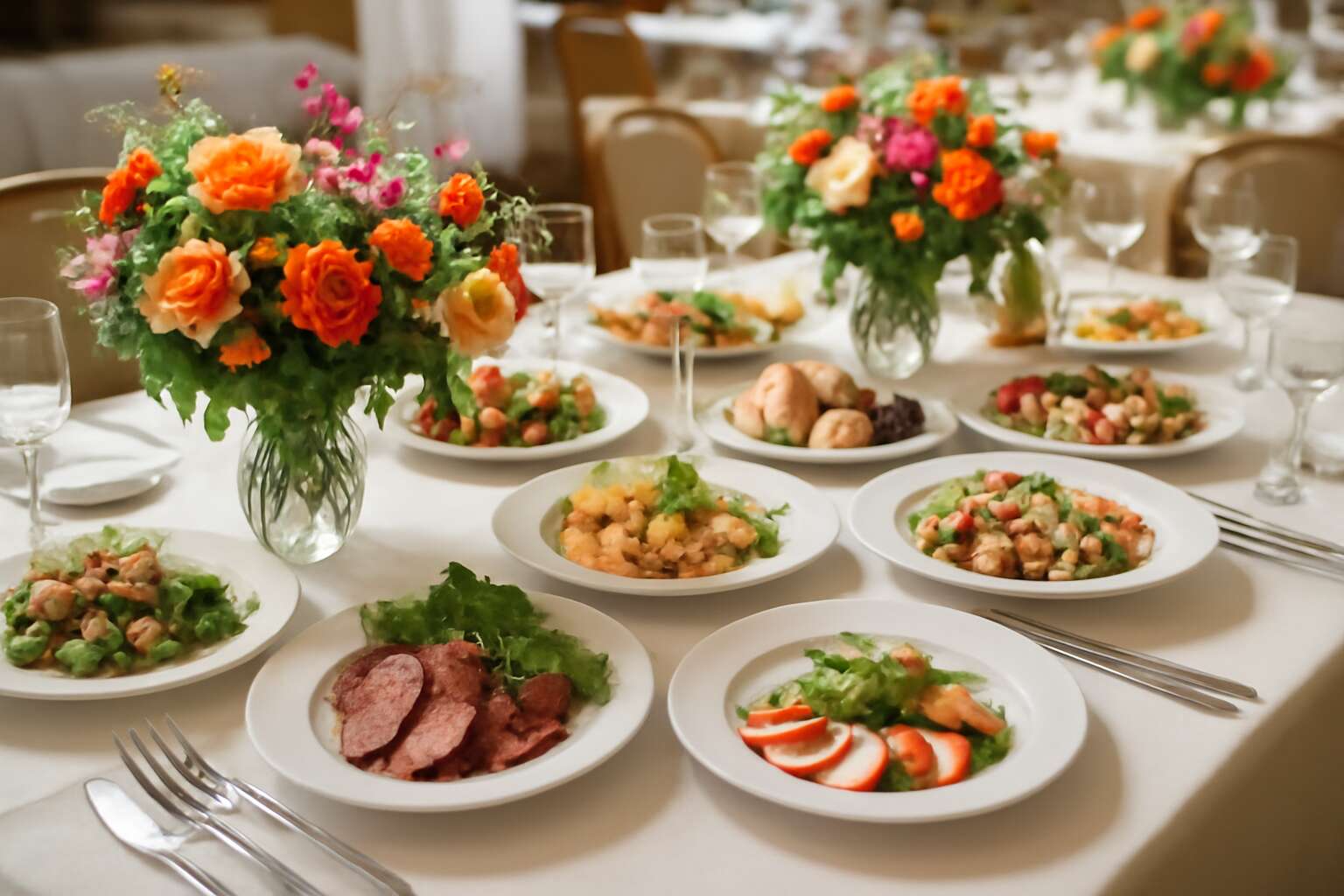Understanding the Catering and Hospitality Industry
History and Evolution of Catering and Hospitality
Stepping into the realm of catering and hospitality subjects is like opening a portal to centuries of cultural exchange and innovation. From the bustling markets of ancient civilizations to the refined ballrooms of modern South Africa, the industry has continuously evolved, mirroring societal shifts and technological breakthroughs. It’s a tapestry woven with stories of artisans, visionaries, and entrepreneurs who transformed simple nourishment into an art form that unites communities and celebrates diversity.
The history of catering and hospitality reveals a fascinating progression, driven by the innate human desire for connection and celebration. During the Middle Ages, banquets became symbols of power and diplomacy, laying the foundation for today’s global culinary trends. Fast forward to the 20th century, where the rise of corporate events and tourism spurred innovation in service delivery—shaping the dynamic landscape we see now.
Understanding this evolution is essential for anyone navigating the catering and hospitality subjects landscape. It highlights how tradition and innovation dance together, creating experiences that are both rich in history and bursting with modern flair. South Africa’s vibrant cultural mosaic, in particular, offers a unique backdrop for this ever-changing industry, where every event becomes a story told through flavors and hospitality.
Current Trends Shaping the Industry
Across South Africa, the catering and hospitality subjects industry is experiencing a remarkable shift driven by consumer expectations and technological innovation. Today’s clients seek more than just a meal—they crave authentic experiences infused with local culture and sustainability. This has prompted venues to rethink their approach, blending tradition with cutting-edge service delivery methods to create memorable moments.
One of the most striking current trends is the rise of personalized catering services that cater to individual dietary needs and preferences. Guests no longer settle for generic menus; instead, they desire culinary journeys that reflect their stories and values. Additionally, the integration of digital technology, such as online booking systems and virtual event planning, has transformed how catering and hospitality subjects are delivered, making processes more seamless and accessible.
- Emphasis on sustainability and eco-friendly practices, from sourcing local ingredients to reducing waste.
- The growing popularity of experiential dining, where storytelling and ambiance elevate the culinary experience.
- The expansion of hybrid events that combine in-person and virtual elements, broadening reach and inclusivity.
Understanding these current trends offers vital insight into the dynamic landscape of catering and hospitality subjects, ensuring businesses remain relevant and innovative in South Africa’s vibrant market.
Key Stakeholders and Their Roles
Understanding the intricate web of stakeholders within the catering and hospitality subjects industry reveals a fascinating tapestry of roles and influences. Each player, from suppliers to event organizers, contributes to a delicate balance that transforms ordinary gatherings into extraordinary experiences. In South Africa’s vibrant market, this web becomes even more complex, woven with cultural nuances and innovative practices.
At the core are the service providers—chefs, waitstaff, and event planners—who shape the guest experience through skill and creativity. Equally vital are suppliers, whose role extends beyond mere provision of ingredients; they uphold sustainability and authenticity by sourcing local, eco-friendly products. This interconnected ecosystem ensures the delivery of high-quality, personalized services that align with the latest industry trends in catering and hospitality subjects.
To grasp the full scope, consider this list of key stakeholders:
- Event organizers and planners
- Food and beverage suppliers
- Venue managers
- Technological service providers
- Marketing and PR teams
Each stakeholder’s role is pivotal in fostering innovation, embracing sustainability, and crafting memorable moments that resonate within South Africa’s dynamic catering and hospitality subjects landscape. Their collaboration is the unseen force that drives the industry forward, blending tradition with modernity in a seamless dance of service excellence.
Core Concepts in Catering and Hospitality
Types of Catering Services
At the heart of catering and hospitality subjects lies a fundamental understanding of core concepts that define the industry’s essence. These principles shape every event, from an intimate gathering to a grand corporate affair. Recognizing the importance of quality service, attention to detail, and customer satisfaction is paramount—elements that transform ordinary moments into memorable experiences. In South Africa’s vibrant market, the diversity of catering styles reflects a rich cultural tapestry, demanding adaptability and innovation from industry professionals.
There are several types of catering services, each suited to different occasions and client needs. These include:
- Corporate Catering: Tailored for business events, conferences, and meetings, emphasizing efficiency and professionalism.
- Weddings and Social Events: Creating magical atmospheres with personalized menus and thematic presentation.
- Event Catering: Covering large festivals, exhibitions, or community gatherings, often requiring logistical precision and scalability.
- Specialized Catering: Focusing on niche markets such as health-conscious, vegetarian, or ethnic cuisine, reflecting South Africa’s diverse culinary landscape.
Understanding these catering and hospitality subjects is crucial for delivering exceptional service that resonates with clients and leaves a lasting impression. It’s a delicate dance of artistry and precision—each detail meticulously curated to elevate the event experience beyond expectations.
Hospitality Sector Overview
Within the intricate tapestry of catering and hospitality subjects, a fundamental grasp of core concepts is essential for navigating the industry’s nuanced landscape. At its essence, the hospitality sector is not merely about serving food or accommodating guests; it is about orchestrating an experience that resonates on a visceral level. The delicate interplay between service excellence, cultural sensitivity, and operational efficiency forms the backbone of every successful event. In South Africa’s vibrant market, these principles acquire even greater significance, reflecting a multicultural mosaic that demands both adaptability and authentic engagement.
Central to understanding the hospitality sector is recognizing that each event—be it a corporate conference or a traditional wedding—requires tailored strategies rooted in core concepts such as customer-centricity, logistical precision, and culinary innovation. These elements ensure that service delivery transcends expectation, creating memorable moments that forge lasting impressions. As industry professionals delve deeper into catering and hospitality subjects, they discover that success hinges on mastering the art of balancing meticulous attention to detail with the flexibility to innovate in response to diverse client needs.
Customer Experience and Satisfaction
In the world of catering and hospitality subjects, few elements are as crucial as the customer experience. It’s not enough to simply serve food or provide a space; every interaction must be purposeful and memorable. When guests walk into an event or venue, they seek more than just sustenance—they crave an emotional connection that leaves a lasting impression. This is where satisfaction becomes an art form, crafted meticulously through attention to detail and genuine engagement.
Understanding the core concepts behind customer satisfaction involves more than just meeting expectations; it’s about exceeding them. Excellent service, personalized touches, and cultural sensitivity are vital ingredients in creating an atmosphere that resonates deeply. In South Africa’s diverse market, catering and hospitality subjects demand a nuanced approach—balancing authenticity with innovation. For instance, implementing a tailored approach can involve:
- Customized menu options that reflect local flavors and preferences
- Staff trained to recognize cultural nuances and etiquette
- Attention to ambient details that elevate the overall experience
Mastering these elements ensures that every event becomes an immersive journey, where satisfaction isn’t just achieved—it’s amplified. In this competitive landscape, the true magic of catering and hospitality subjects lies in transforming service delivery into an unforgettable experience that keeps guests coming back, craving more with each encounter.
Operational Aspects of Catering and Hospitality
Menu Planning and Food Preparation
In the intricate dance of catering and hospitality subjects, operational aspects of menu planning and food preparation often determine the soul of the experience. Behind every flawless event lies a meticulous orchestration of resources, timing, and human finesse. The challenge is not merely in selecting dishes but in crafting a cohesive culinary narrative that resonates with guests’ expectations and cultural sensitivities, especially within South Africa’s diverse landscape.
Food preparation, therefore, becomes an act of both artistry and precision. It involves balancing freshness with efficiency, ensuring that every plate reflects quality while maintaining operational fluidity. A well-designed menu must consider the seasonality of ingredients, sourcing sustainable produce, and aligning with the available kitchen infrastructure. This layered complexity underscores the importance of strategic planning in catering and hospitality subjects, where every detail counts.
To streamline operations, many professionals adopt a systematic approach, such as:
- Menu engineering to optimize ingredient use and minimize waste
- Workflow analysis to enhance kitchen productivity
- Implementing quality control measures at every stage of food prep
In essence, mastering these operational aspects is about understanding the human element—anticipating needs, managing expectations, and fostering a culture of excellence that elevates the entire catering and hospitality experience.
Supply Chain and Inventory Management
In the dynamic realm of catering and hospitality subjects, the supply chain and inventory management form the backbone of seamless operations. A single misstep can ripple through the entire event, revealing how crucial meticulous oversight truly is. South Africa’s diverse landscape presents unique challenges—seasonal fluctuations, local sourcing, and fluctuating demand all demand strategic finesse. Effective inventory management isn’t just about stockpiling; it’s about anticipating needs, reducing waste, and optimizing resource allocation.
Operational excellence often hinges on a few key principles: maintaining real-time inventory data, forging reliable supplier relationships, and adopting innovative tracking systems. These elements help prevent shortages and overstocking, both of which can derail a flawless catering event. Implementing a systematic approach, such as:
- Regular stock audits
- Demand forecasting based on historical data
- Flexible supply chain arrangements
ensures that every ingredient and piece of equipment aligns with the event’s specific requirements. In the intricate dance of catering and hospitality subjects, mastery of supply chain and inventory management elevates the entire experience—transforming what could be chaos into a symphony of precision and grace.
Staffing and Training
In the grand theatre of catering and hospitality subjects, the choreography of staffing and training emerges as the silent symphony behind every flawless event. It is the human element—those diligent hands and attentive minds—that transforms a mere gathering into an unforgettable experience. As the industry evolves, so too must the skills and resilience of those who serve at its heart.
Mastery in this realm requires more than just technical aptitude; it demands a keen understanding of the delicate art of guest interaction, swift problem-solving, and unwavering professionalism. Effective training programs—designed to cultivate a culture of excellence—are vital. They ensure staff are not just equipped with knowledge but are inspired to embody the hospitality ethos.
Within the intricate tapestry of catering and hospitality subjects, a few key operational aspects stand tall:
- comprehensive onboarding processes
- ongoing skills development
- emphasis on teamwork and communication
These pillars foster an environment where efficiency and warmth coexist, elevating service to an art form. When staff are aligned with the vision of excellence, the entire event resonates with grace and precision—an orchestrated ballet of human effort and passion.
Health and Safety Regulations
In the vibrant tapestry of catering and hospitality subjects, ensuring health and safety regulations are meticulously followed is paramount. These regulations are not merely bureaucratic hoops but the backbone of trust between service providers and guests. In South Africa, compliance with these standards safeguards both staff and patrons, fostering an environment where everyone feels secure and valued.
Operational aspects such as rigorous hygiene protocols, proper food handling, and regular safety audits are essential. These measures help prevent accidents and foodborne illnesses, which can tarnish a venue’s reputation overnight. A simple yet vital step is maintaining accurate records of safety training and inspections—these serve as a testament to a venue’s commitment to excellence.
It’s also crucial to stay updated with evolving health policies. For example, COVID-19 has underscored the importance of social distancing and sanitization within catering and hospitality subjects. Implementing clear signage, providing hand sanitizers, and training staff on new safety procedures ensure a seamless blend of service and safety. When health and safety regulations are woven into daily operations, they elevate the entire hospitality experience—one rooted in genuine care and professionalism.
Technology in Service Delivery
In the realm of catering and hospitality subjects, technology has become the silent conductor orchestrating seamless service delivery. From sophisticated point-of-sale (POS) systems to real-time inventory management, the digital landscape transforms how venues operate, ensuring efficiency and precision at every turn. These tools are not mere gadgets; they are the heartbeat of modern hospitality, enabling staff to focus on what truly matters—creating memorable guest experiences.
One of the most captivating innovations is the integration of cloud-based platforms, which allow for instant updates on stock levels, menu modifications, and staffing schedules. This connectivity ensures that service runs like a well-rehearsed symphony, even in the busiest moments. For catering and hospitality subjects, embracing such technology means elevating service standards and reducing operational friction.
Additionally, automation tools facilitate smoother guest interactions through online reservations, digital menus, and contactless payments. This not only streamlines operations but also aligns with evolving customer expectations for convenience and safety. By weaving technology into daily routines, hospitality providers craft an environment where exceptional service and cutting-edge innovation dance harmoniously, enriching the overall guest experience.
Marketing and Business Growth in Catering and Hospitality
Branding and Unique Selling Propositions
In an industry where first impressions are everything, marketing and business growth hinge on the power of authentic branding and compelling unique selling propositions (USPs). For catering and hospitality subjects, these elements are not merely promotional tools—they are the very heartbeat of a memorable experience. When a brand tells a story that resonates, it transforms guests from mere customers into loyal advocates, fueling sustainable growth.
Crafting a distinct identity in the competitive South African landscape requires more than just excellent service; it demands strategic differentiation. A well-defined USP might emphasize farm-to-table freshness or an exclusive cultural fusion that elevates a venue from ordinary to extraordinary. These distinctive qualities become pivotal in carving out a niche, attracting discerning clients seeking not just catering and hospitality subjects but a truly immersive experience.
To effectively amplify your presence, consider harnessing digital channels that reflect the elegance and authenticity of your brand. Visual storytelling—through high-quality images and engaging narratives—can cultivate an emotional connection, transforming fleeting interest into enduring loyalty. In this way, marketing for catering and hospitality subjects becomes a symphony of storytelling, branding, and strategic positioning that propels business growth beyond the conventional.
Online Presence and Digital Marketing
In a digital age where every click can make or break a brand, the online presence of catering and hospitality subjects becomes an irresistible gateway to success. A compelling digital footprint not only amplifies visibility but also cultivates trust among discerning clients in South Africa’s vibrant market. When potential guests or event organizers search for exceptional catering and hospitality subjects, your website and social media channels are often the first impression they encounter. This is where strategic digital marketing can transform a fleeting browser into a loyal patron.
Harnessing the power of visual storytelling—through high-resolution images, immersive videos, and authentic narratives—can evoke emotions that linger long after the scroll. By aligning your digital content with your unique selling propositions, you create a resonant brand story that sets you apart from competitors. Incorporating targeted keywords such as “catering and hospitality subjects” seamlessly into your website content ensures your business ranks higher in search results, drawing in those seeking memorable culinary experiences and exceptional service.
- Optimize your website for mobile devices, ensuring that visitors enjoy a seamless browsing experience.
- Engage with audiences through social media platforms by sharing behind-the-scenes moments, customer testimonials, and upcoming events.
- Leverage local SEO strategies to attract nearby clients searching for catering and hospitality subjects in South Africa.
By weaving these elements into your digital marketing, your catering and hospitality subjects will not only shine online but also inspire a sense of wonder and anticipation that keeps your brand top of mind. Every pixel and post becomes part of a larger narrative—one that invites clients into an immersive world of exquisite taste and unforgettable experiences.
Customer Engagement and Feedback
In the realm of catering and hospitality subjects, the true alchemy of success lies in the art of genuine engagement. Every interaction, every whisper of feedback, becomes the melody that shapes a brand’s destiny. Customer engagement is no longer a mere transaction; it’s a symphony of trust, loyalty, and shared experiences that elevate your standing in South Africa’s vibrant market. When clients feel heard—when their voices echo back through personalized responses and thoughtful gestures—the bond deepens, transforming one-time patrons into lifelong ambassadors.
Feedback, whether a glowing review or constructive critique, is the vital compass guiding your journey through the ever-shifting landscape of catering and hospitality subjects. Embracing this dialogue allows you to refine your offerings, enhance service quality, and forge authentic connections. Consider these pillars of growth:
- Listening actively to customer insights
- Responding promptly and thoughtfully
- Implementing improvements based on real experiences
By cultivating an environment where feedback flourishes, your catering and hospitality subjects become not just providers of culinary delight but architects of memorable moments that resonate long after the event concludes. This dance of engagement and refinement is the heartbeat of business growth—an ongoing testament to your commitment to excellence in every facet of service.
Sustainable Practices and Eco-Friendly Initiatives
Challenges and Future Outlook
Industry Challenges
As the catering and hospitality subjects evolve in South Africa, industry challenges loom like ancient titans awakening from their slumber, demanding innovative resilience and agility. One of the most pressing hurdles remains the volatile supply chain, where unpredictable disruptions threaten to unravel seamless service delivery. Fluctuating costs and logistical bottlenecks often leave operators scrambling, trying to preserve quality while managing tight budgets.
Looking ahead, the future of catering and hospitality subjects is painted with both shadows and shimmering possibilities. Sustainability, for instance, will no longer be optional but a cornerstone of responsible practice—demanding eco-friendly initiatives and circular economy models. Technology, especially automation and AI, promises to revolutionize service delivery, making it more personalized and efficient. Yet, these advancements also pose the challenge of upskilling staff quickly and effectively to keep pace with rapid change.
In this landscape, navigating the labyrinth of industry challenges requires a strategic blend of tradition and innovation. South Africa’s catering and hospitality subjects will continue to adapt, driven by a resilient spirit and an unwavering commitment to excellence. As the industry transforms, those who embrace change with foresight and agility will secure their place in this vibrant, ever-shifting realm.
Innovations and Technological Advances
The landscape of catering and hospitality subjects in South Africa is at a pivotal crossroads, where resilience and innovation must intertwine more than ever. Industry challenges such as supply chain disruptions and rising operational costs threaten to overshadow growth, yet they also serve as catalysts for transformation. The future of catering and hospitality subjects hinges on embracing cutting-edge innovations that redefine service delivery while maintaining a steadfast commitment to quality.
Technological advances like automation and artificial intelligence are set to revolutionize how businesses operate, offering unparalleled personalization and efficiency. Companies investing in these tools will find themselves better equipped to navigate unpredictable market dynamics and enhance customer satisfaction. As the industry evolves, sustainability will become non-negotiable, pushing operators to adopt circular economy models and eco-friendly initiatives that resonate with conscious consumers.
South African catering and hospitality subjects will continue to adapt through strategic integration of these innovations, ensuring they stay ahead of the curve. The path forward is illuminated by a blend of tradition and modernity, where agility and foresight unlock new opportunities in this vibrant sector. Embracing these technological and sustainable trends is not just an option but a necessity for thriving in the ever-shifting realm of catering and hospitality subjects.
Market Expansion Opportunities
Challenges in the catering and hospitality subjects landscape are more than mere obstacles—they are catalysts demanding profound resilience and adaptability. Market fluctuations, fluctuating consumer preferences, and regulatory complexities threaten to obscure growth prospects, yet they also create fertile ground for innovation. The future hinges on how deftly operators can harness emerging opportunities while confronting these hurdles head-on.
Expansion opportunities are palpable, especially within South Africa’s burgeoning tourism sector and rising middle class. Strategic diversification into niche markets like eco-conscious catering or experiential hospitality could unlock new revenue streams. A key avenue lies in technological integration, which enables businesses to tap into global markets and elevate customer engagement. For example, leveraging digital marketing and online booking platforms expands reach beyond traditional confines.
- Investing in sustainable practices aligns with global trends and local consumer values, creating competitive differentiation.
- Developing innovative event concepts tailored to diverse cultural needs enhances brand relevance.
- Expanding into underserved regions offers untapped potential for growth, especially in rural areas seeking quality hospitality services.
In this dynamic environment, the capacity to anticipate future shifts within the catering and hospitality subjects realm will determine who thrives and who falls behind. The horizon beckons with promise, but only for those committed to continuous evolution and strategic foresight.




0 Comments